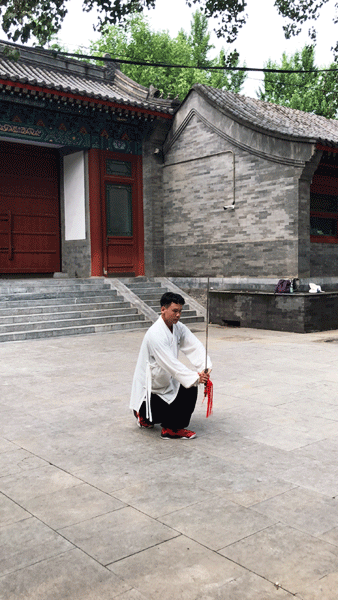 |
|
Qin Hanlin, the tai chi coach, performs tai chi for the participants. [Photo by Zhou Bing/chinadaily.com.cn] |
When the participants were led to a quiet garden, they met with their 17-year-old tai chi coach, Qin Hanlin. Though young, Qin has rich experience in teaching tai chi after learning kung fu for eight years.
The participants lined up, ready to experience tai chi, an intangible cultural heritage at the national level. Coach Qin slowly showed some simple but useful tai chi movements and explained the function of tai chi. Through the activity, the organizers and Taoists wanted to deliver the Taoist culture of cultivating life and maintaining good health.
Tai chi is not just a sport or a competitive routine. It is a persistent symbol and way of spiritual practice rooted in traditional Chinese culture. The slow but powerful movements of tai chi can not only help people improve their health, but also help them relax and calm down when they become tired and irritable. In this way, people find peace in the yin and yang, the static and dynamic movements, of tai chi.
Tai Chi Home, created by Wang Mingshan, a descendant of Wudang tai chi, is a cultural communication, exchange and learning platform that aims to promote tai chi culture and the quality of life. The nonprofit teaching of tai chi and other traditional culture courses -- such as those on tea ceremonies and the guqin, a traditional Chinese instrument -- are regularly held there to raise people's awareness about staying healthy and changing their ways of life.
Participants said that they were very interested in tai chi and were willing to learn more about it after the activity, since many nonprofit courses were given in the temple. Some participants had even signed up for more similar activities, and looked forward to experiencing other forms of intangible cultural heritage.